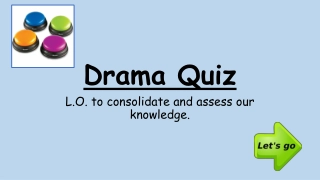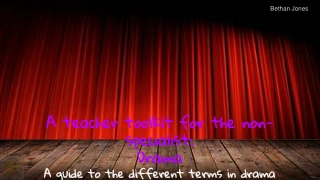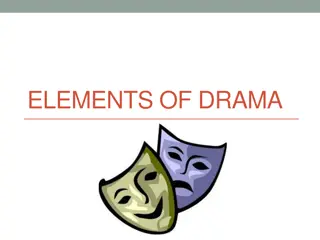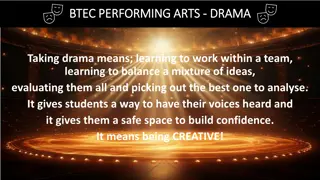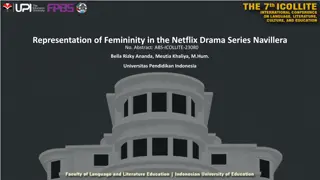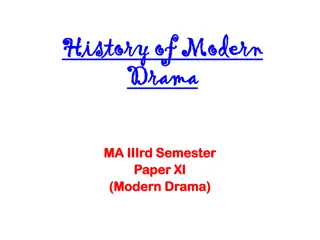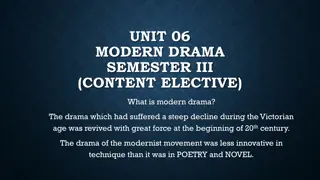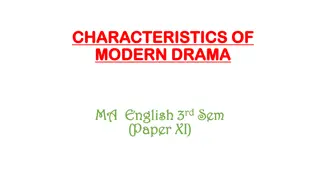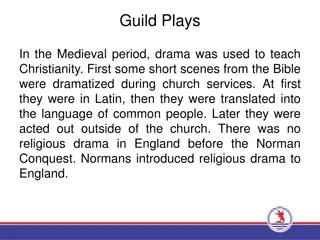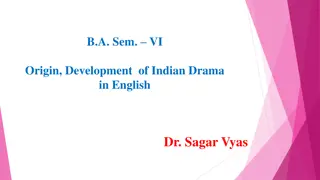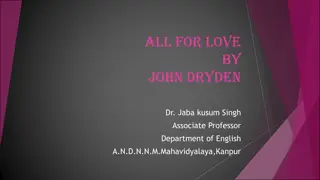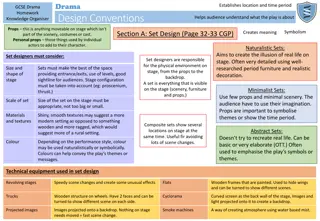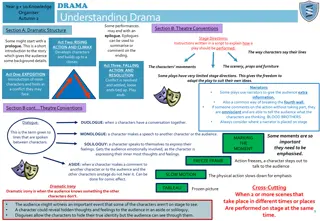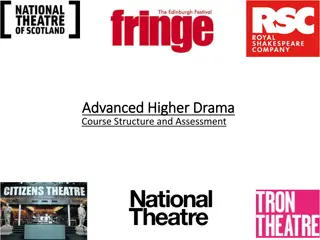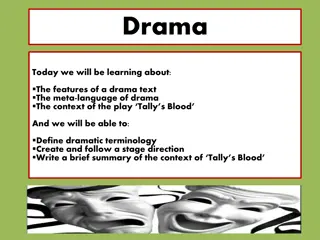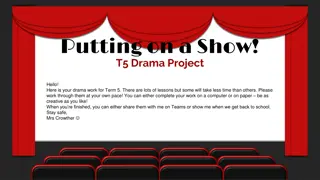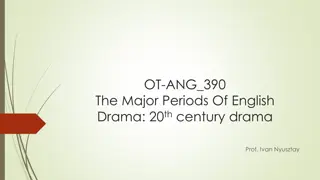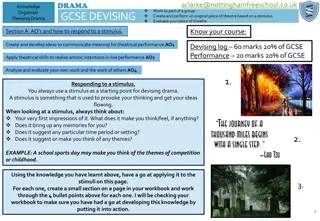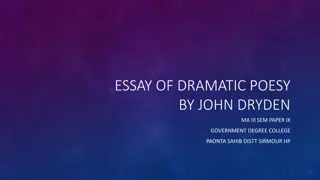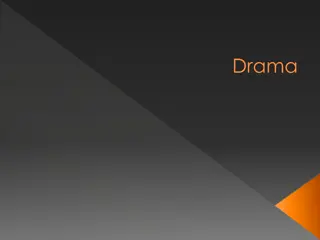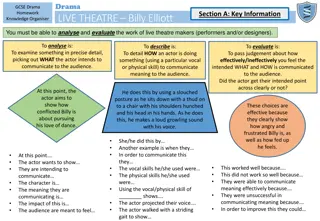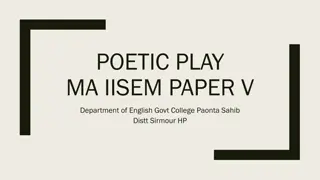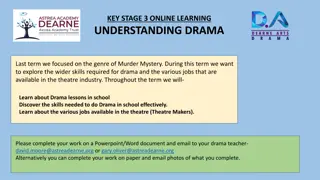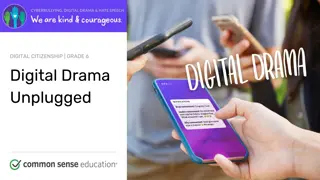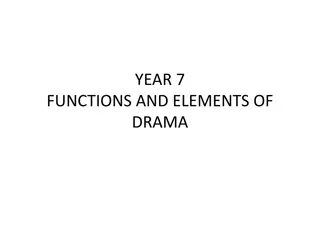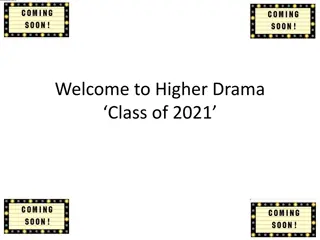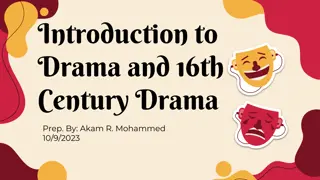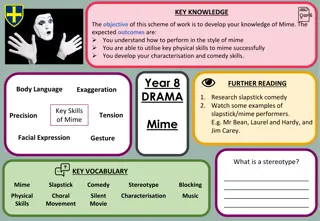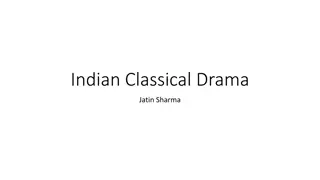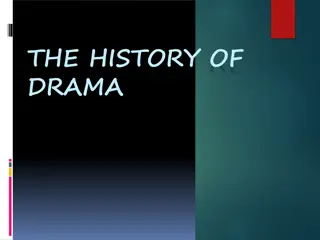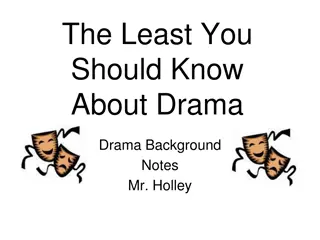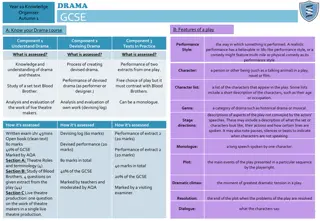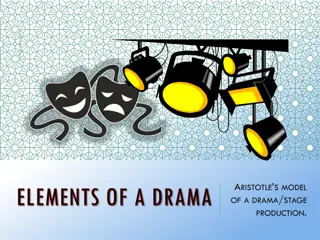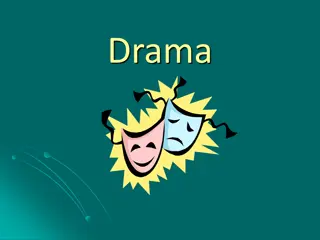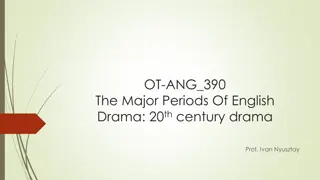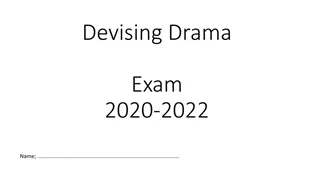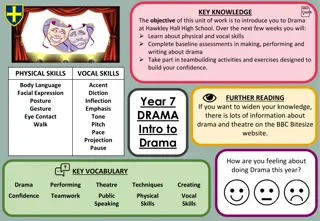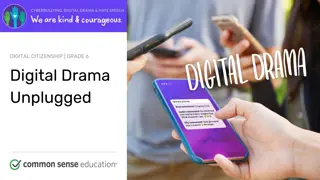Drama Quiz
Test your knowledge of drama styles and genres with this quiz. Explore topics like skills and devices, roles and responsibilities, and staging techniques. Includes questions and answers to consolidate your understanding.
1 views • 46 slides
A Comprehensive Guide to Drama Teaching for Non-Specialists
Bethan Jones explores the essence of drama, its benefits, and how it enriches children's lives. The guide delves into key drama terminology, emphasizing improvisation, scripts, props, scenes, and more. With a focus on creative expression and active learning, this toolkit empowers educators to engage
0 views • 30 slides
Understanding the Elements of Drama and Theater History
Drama, originating from the Greek verb "dran," involves acting and storytelling in front of an audience. Explore the key aspects, from the Globe Theater in London to dramatic structure, actors, and speech forms like dialogue and monologue. Learn about the crucial components such as playwrights, acto
4 views • 22 slides
BTEC Tech Award Level 2 in Performing Arts Drama Overview
Explore the BTEC Tech Award Level 2 in Performing Arts Drama, a course designed to develop students' skills in drama and performing arts. The course covers various aspects from exploring different plays and theater styles to developing acting skills and techniques, culminating in creating a devised
0 views • 5 slides
Exploring Femininity in Netflix's "Navillera" Drama Series
Discussions on femininity in relation to gender expectations and cultural constructs are explored in the context of the Netflix drama series "Navillera." Using a qualitative approach, the research delves into the representation of feminine qualities and how they are depicted in the series. Various t
0 views • 11 slides
Evolution of Modern Drama in English Literature: A Comprehensive Overview
Modern drama in English literature evolved through different phases from the late 19th to the mid-20th century, showcasing innovative techniques and themes. The revival of drama in the 20th century brought forth various trends and currents, reflecting social issues and nationalistic sentiments. This
0 views • 7 slides
Exploring Modern Drama: History and Characteristics
Modern drama, revived in the early 20th century after a decline in the Victorian age, encompasses realism, plays of ideas, romanticism, and poetic elements. English drama during the modernist period is categorized into phases marked by influential playwrights like Henrik Ibsen, G.B. Shaw, T.S. Eliot
0 views • 9 slides
Evolution of Modern Drama in the 20th Century: Characteristics and Trends
Modern drama in the 20th century experienced a revival and various trends. Realism was a significant quality where dramatists like Ibsen focused on portraying real problems of life. Problem plays emerged, addressing societal issues like marriage and justice. Modern drama shifted towards being a stag
1 views • 14 slides
Medieval Drama: Guild Plays and Moral Lessons
Learn about the evolution of medieval drama in England, from religious guild plays to morality plays and interludes. Guild plays, including mystery and miracle plays, were performed by craft guilds to teach Christianity through biblical stories. Morality plays like "Everyman" aimed to impart moral l
3 views • 9 slides
Origin and Development of Indian Drama in English
Indian English Drama has a rich history, starting from the Sanskrit plays of the Vedic Age to prominent playwrights like Rabindranath Tagore and Sri Aurobindo Ghosh. The genre saw a resurgence in the 20th century with significant contributions from various playwrights marking its evolution through s
0 views • 8 slides
Analysis of "All for Love" by John Dryden
All for Love" by John Dryden is considered a masterpiece and an imitation of Shakespeare's work. Dryden acknowledges Shakespeare's superiority as a dramatist but adds his own perspective in this heroic play, focusing on Antony and Cleopatra. The drama demonstrates structural quality with coherence a
6 views • 29 slides
Drama Design Conventions in Set and Lighting for GCSE Drama Productions
This guide delves into the essential aspects of drama design conventions, focusing on establishing location and time period, utilizing props for symbolism, and creating immersive sets using naturalistic, minimalist, and abstract approaches. It also explores the crucial role of lighting in setting th
0 views • 5 slides
Theater Conventions and Characterization in Drama
Theater conventions such as prologues, epilogues, dialogues, monologues, and dramatic structure like exposition, rising action, climax, falling action, and resolution are explored in drama. Additionally, the importance of character creation through techniques like backstories, flashbacks, and flashf
0 views • 4 slides
Advanced Higher Drama Course Overview: Structure, Assessment & Requirements
This course structure in Advanced Higher Drama involves a project dissertation, an assignment based on a production, and a performance exam. The assessment includes analyzing productions, practical work, and written demands. Entry requirements include achieving a pass in Higher Drama and English, al
1 views • 11 slides
Exploring the Context of "Tally's Blood" - Drama Study Session
In this drama study session, we delve into the features of drama texts, the meta-language of drama, and the context of the play "Tally's Blood" by Ann Marie Di Mambro. We learn to define dramatic terminology, create and follow stage directions, and write a summary of the play's context. The images p
2 views • 94 slides
Design Your Dream Theatre Project for Term 5 Drama
Embark on an exciting drama project for Term 5 by researching different types of theatres, selecting an auditorium, designing the interior and exterior of your theatre, and creating a mood board for decorating and furnishing. Get creative and pick a name that aligns with the theme of your envisioned
0 views • 49 slides
Evolution of English Drama in the 20th Century: Shaw, Ibsen, and Modernist Theatre
The 20th century English drama witnessed significant shifts, from the realism and naturalism of George Bernard Shaw and Ibsen to the modernist theatre of Samuel Beckett, Tom Stoppard, and Harold Pinter. Themes of social change, rejection of traditional ideals, and a focus on human experiences domina
0 views • 39 slides
Devising Drama - GCSE Knowledge Organiser
This GCSE Drama Knowledge Organiser provides guidance on devising and performing an original piece of theatre based on a stimulus. It covers how to respond to stimuli, develop ideas for theatrical performances, apply theatrical skills, analyze and evaluate work, and rehearse and refine the devised p
0 views • 10 slides
Debate on Dramatic Poesy by John Dryden
John Dryden's work "Essay of Dramatic Poesy" is a dialogue among four speakers that debates the merit of classical versus modern drama, the comparison between French and English drama, and the use of rhyme in plays. Each speaker presents arguments showcasing their perspectives on these topics, revea
0 views • 5 slides
Insight into Drama: Its Elements and Impact
Drama, a form of art designed for live performances on stage, relies on dialogue and action to engage the audience. Through actors, facial expressions, gestures, and soliloquies, drama conveys emotions and complexities. The stage setting creates a captivating experience, commanding the audience's at
0 views • 11 slides
Analysis of Live Theatre in "Billy Elliot" for GCSE Drama Homework
In this drama homework knowledge organiser for GCSE Drama, students are guided on how to analyze and evaluate the work of live theatre makers, focusing on the key information related to the play "Billy Elliot." The document provides explanations on analyzing, describing, and evaluating the performan
0 views • 7 slides
Evolution of Poetic Drama in the 20th Century
Poetic drama, pioneered by T.S. Eliot, marked a significant literary movement in the 20th century. Eliot's contributions, along with efforts from predecessors such as W.B. Yeats and contemporaries like Auden and Isherwood, revitalized the genre. The fusion of traditional and experimental elements, r
1 views • 9 slides
Exploring Drama Skills and Theatre Jobs in Key Stage 3 Online Learning
Dive into the realm of drama in Key Stage 3 online learning focusing on developing a broader understanding of drama skills beyond Murder Mystery genre exploration. Uncover the necessary skills for effective drama engagement in school, explore various jobs in the theatre industry, and reflect on the
0 views • 8 slides
Understanding Digital Drama in Grade 6
Explore the concept of digital citizenship and learn strategies to de-escalate digital drama online. Engage in group discussions focusing on respectful communication and reflect on the impact of digital drama on individuals. Watch and discuss real-life scenarios of dealing with digital drama to enha
0 views • 15 slides
Understanding the Functions and Elements of Drama in Year 7 Curriculum
Explore the functions and elements of drama with Year 7 students in this engaging lesson. Understand how drama educates, informs, entertains, promotes tolerance, and more. Dive into the key elements like script, plot, diction, characterization, actors, and stage. Learn about playwrights and categori
0 views • 9 slides
Higher Drama Class of 2021 Overview
This overview provides information on the purpose and aims, skills, classwork, exams, attendance requirements, and developing complex drama skills in the Higher Drama Class of 2021. Candidates will develop practical drama skills, explore historical and cultural influences, and enhance production ski
1 views • 18 slides
Understanding Drama: Elements, Types, and Examples
Drama is a captivating form of literature brought to life by actors on stage. Originating in ancient Greece, drama encompasses key elements like plot, characters, setting, dialogue, and theme. The main types of drama include tragedy, comedy, tragicomedy, and historical drama, each offering unique st
1 views • 25 slides
Drama Scheme Development Overview
This drama scheme aims to enhance knowledge in Mime, Devising Theatre, and John Godber's style practically. Students will improve performance skills, characterisation, and comedy abilities through studying slapstick comedy, body language, devising techniques, and monologues/duologues. Key vocabulary
0 views • 5 slides
Understanding Drama Form and Genre
Exploring the nuances of drama, this content delves into the intricate relationship between form and genre. Offering insights into the varied types of forms in drama such as scripted plays, physical theatre, mime, monologues, movement/dance dramas, musicals, and pantomimes, it emphasizes the flexibi
0 views • 17 slides
Insights into Indian Classical Drama and Literature
Explore the rich tradition of Indian classical drama and literature, from its origins in Ujjain during the Gupta period to the classification of major and minor dramas. Learn about the components of a classical Sanskrit drama, such as the plot, characters, sentiments, acting, and more. Delve into th
1 views • 9 slides
The Evolution of Drama: A Historical Journey
Drama, originating from ancient Greece, has evolved through the centuries from being a genre of poetry to a distinct theatrical form encompassing tragedy, comedy, and more. The masks of Thalia and Melpomene symbolize the essence of comedy and tragedy, while the Great Dionysia festival in Athens hono
0 views • 41 slides
Understanding Drama: Insights and Uniqueness Explored
Delve into the essence of drama through this insightful exploration covering the definition of drama, its unique characteristics, the power it holds, comparison with live theater, TV, and film, and the differences between reading plays and fiction. Discover how drama is a form of art meant to be per
0 views • 25 slides
GCSE Drama Year 10 Knowledge Organiser - Features, Assessments, and Terminology
This GCSE Drama knowledge organiser covers features of a play, assessments, performance styles, components of the course, text analysis, and terminology related to vocal and physical skills. Students will delve into character analysis, plot structure, live theatre evaluation, and the process of crea
0 views • 6 slides
Understanding Aristotle's Model of Drama & Core Elements
Explore Aristotle's model of drama and the core elements of stage production. Learn how dramas differ from traditional stories, analyze scripts like "The Monsters Are Due on Maple Street," and delve into the 6 key elements of drama as outlined by Aristotle. Get ready to uncover the nuances of settin
0 views • 16 slides
Understanding Drama: Origins, Structure, Tragedy, and Comedy
Drama is a compelling form of storytelling dating back to ancient Greek times, with plays performed for live audiences. Exploring the origins of drama, its dramatic structure involving conflict and resolution, the essence of tragedy with its tragic heroes, and the light-hearted nature of comedy with
0 views • 28 slides
Exploring the Evolution of English Drama in the 20th Century
In the realm of English drama in the 20th century, significant periods such as Modern British Drama, Naturalism, and the works of George Bernard Shaw shaped the theatrical landscape. From the rejection of past ideals to the emergence of new social commentary, playwrights like Shaw and Ibsen challeng
0 views • 39 slides
Devising Drama Exam Guide: 2020-2022
Understand the Devising Drama Exam for 2020-2022, focusing on key sections like stimulus exploration, performance creation, and final evaluation. Learn about collaborative work, research, idea development, audience engagement, and effective communication in drama. Gain insights on planning, adapting
0 views • 22 slides
Drama Introduction at Hawkley Hall High School
Introduction to Drama at Hawkley Hall High School focuses on exploring physical and vocal skills, participating in team-building activities, and developing confidence in drama. Students will learn about body language, facial expression, posture, gesture, accent, diction, tone, pitch, projection, and
0 views • 5 slides
Understanding and Navigating Digital Drama in Education
Explore the concept of digital drama in education with a focus on de-escalation strategies, group discussion norms, key vocabulary, and real-life scenarios. Engage in thoughtful discussions and activities to understand the impact of online conflicts and ways to address them positively. Watch insight
0 views • 14 slides
Explore the Benefits of Studying GCSE Drama for Your Future Career
GCSE Drama not only prepares you for a career in the Arts but also equips you with diverse skills applicable in various industries. It fosters confidence, problem-solving abilities, leadership qualities, empathy, public speaking skills, and more. By studying GCSE Drama, you open doors to careers in
0 views • 5 slides
